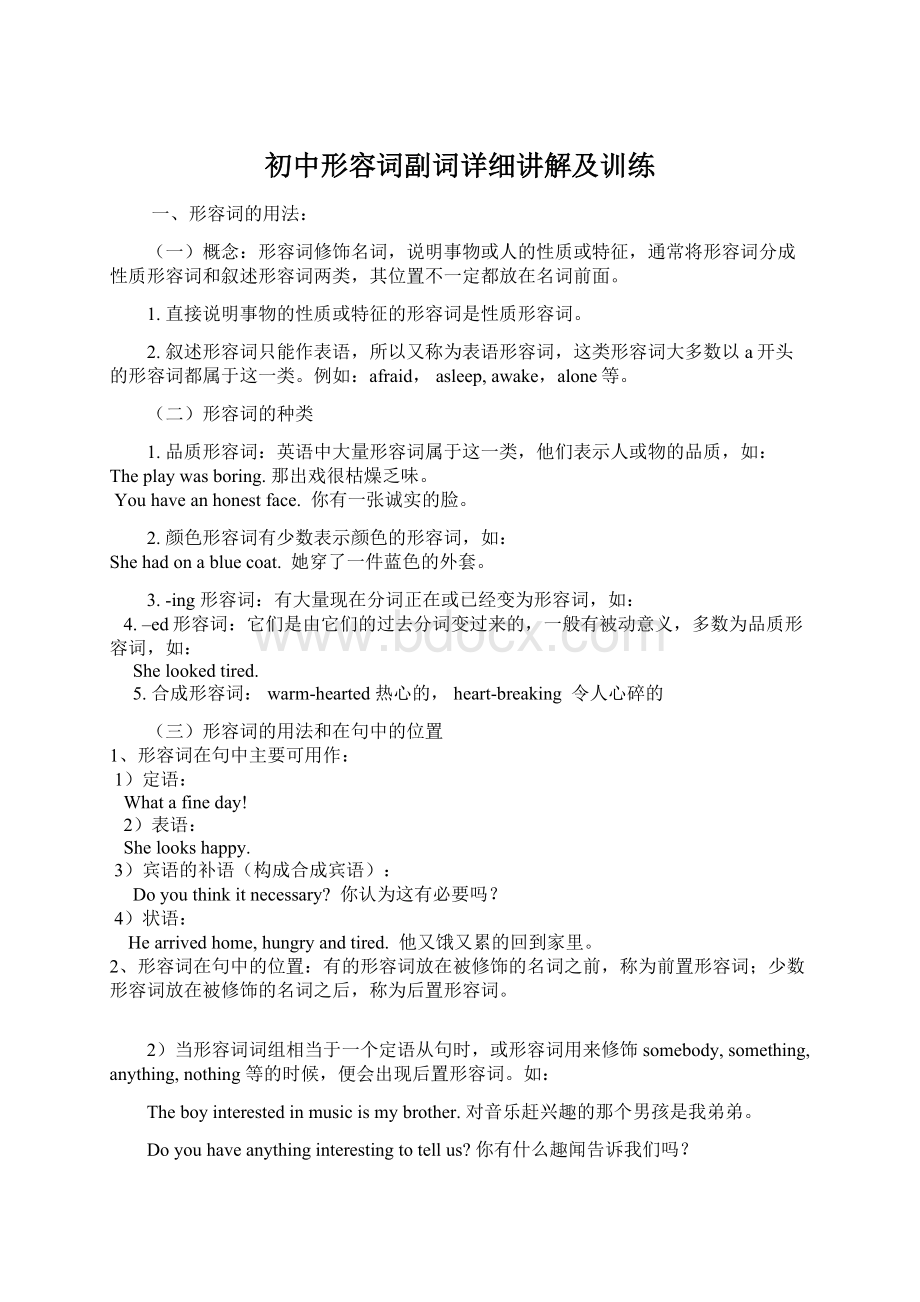 初中形容词副词详细讲解及训练Word文档格式.docx
初中形容词副词详细讲解及训练Word文档格式.docx
- 文档编号:20615200
- 上传时间:2023-01-24
- 格式:DOCX
- 页数:15
- 大小:27.14KB
初中形容词副词详细讲解及训练Word文档格式.docx
《初中形容词副词详细讲解及训练Word文档格式.docx》由会员分享,可在线阅读,更多相关《初中形容词副词详细讲解及训练Word文档格式.docx(15页珍藏版)》请在冰豆网上搜索。

他又饿又累的回到家里。
2、形容词在句中的位置:
有的形容词放在被修饰的名词之前,称为前置形容词;
少数形容词放在被修饰的名词之后,称为后置形容词。
2)当形容词词组相当于一个定语从句时,或形容词用来修饰somebody,something,anything,nothing等的时候,便会出现后置形容词。
如:
Theboyinterestedinmusicismybrother.对音乐赶兴趣的那个男孩是我弟弟。
Doyouhaveanythinginterestingtotellus?
你有什么趣闻告诉我们吗?
3.以-ly结尾的形容词
1)大部分形容词加-ly可构成副词。
但friendly,deadly,lovely,lonely,likely,lively,ugly,仍为形容词。
改错:
(错)Shesanglovely.
(错)Hespoketomeveryfriendly.
(对)Hersingingwaslovely.
(对)Hespoketomeinaveryfriendlyway.
2)有些以-ly结尾既为形容词,也为副词,如daily,weekly,monthly,yearly,early等。
TheTimesisaweeklypaper.《时代周刊》为周刊。
TheTimesispublishedweekly.《时代周刊》每周发行一期。
四.\形容词名词化:
有些形容词前加定冠词后变成名词,表示一类人,谓语常用复数。
这类词有:
rich/poor;
good/bad;
young/old;
healthy/ill;
living/dead;
black/white(表示人种等)。
Theyoungshouldtakegoodcareoftheold.
年轻人应该好好照顾老人。
Therichneverhelpthepoorinthiscountry.
在这个国家,富人从来不帮助穷人。
二、副词的用法:
用以修饰动词、形容词或其他副词的词叫做副词。
not(不),here(这里),now(现在)。
不少副词同时也可用作介词或其它词类。
Haveyoureadthisbookbefore?
(副词,作时间状语)你以前读过这本书吗?
Hewillarrivebeforeteno’clock.(介词,beforeteno’clock是介词短语,作时间状语)他将在10点钟前到达。
(二)副词的种类
1、时间副词有三类:
always,often,usually,sometimes,never,ever,hardly等一般位于系动词、情态动词和助动词之后,实之前义动词
1)表示发生时间的副词:
It’sbeginningtorainnow!
现在开始下雨了!
2)表示频繁程度的副词,也称频度副词always,often,usually,sometimes,never,ever,hardly等一般位于系动词、情态动词和助动词之后,实之前义动词:
Sheoftenchangeshermind.
她常改变主意。
3)还有一些其他表示时间的副词:
Hehasjusthadanoperation.他刚动过手术。
2、地点副词:
1)有不少表示地点的副词:
Sheisstudyingabroad.
她在国外留学。
2)还有一些部分与介词同形的副词。
它们与介词同形,跟宾语的是介词,否则是副词:
①用作介词:
Standup!
起立!
②用作副词:
Acatclimbedupthetree.
猫爬上了树。
3)以where构成的副词也是地点副词:
It’sthesameeverywhere.
到处都一样。
3、方式副词
1)英语中有大量方式副词,说明行为方式(回答how的问题):
Howbeautifullyyourwifedances.
你夫人舞跳的真美。
2)还有相当多的副词,表示某些情绪:
Shesmiledgratefully.
她感激的笑了笑。
3)还有一些以-ly结尾的副词,表示动作发生的状况:
Heleftthetownsecretly.他悄然离开了这座城市。
4、程度副词和强调副词
1)程度副词可修饰动词,表示“到某种程度”:
Isshebadlyhurt?
她伤得重吗?
[说明]这类副词除修饰动词外,还可修饰形容词(a)或另一副词(b):
a.fairlysimple相当简单quitecorrect完全正确
b.wonderfullywell好极了doitveryquickly干得很快
2)much是一个特殊的程度副词,它可以:
修饰比较级
Yousingmuchbetterthanme.你比我唱的好多了。
Theirhouseismuchnicerthanours.他们的房子比我们的好多了。
5.疑问副词和连接副词
1)疑问副词:
疑问副词用来引导特殊问句:
how:
Howisyourgrandmother?
你奶奶身体好吗?
where:
Wheredoesshecomefrom?
她是哪儿人?
when:
Whencanyoucome?
你什么时候能来?
why:
Whywashesolate?
他为什么来得这么晚?
2)连接副词:
连接副词意思和词形都和疑问副词一样,但都引导从句或与不定式连用:
how:
Doyouknowhowtostartthismachine?
你知道这台机器怎样启动吗?
where:
Idon’tknowwherehelives.我不知道他住在哪儿。
(引导宾语从句)
Tellmewhenyou’llbeready.告诉我你什么时候准备好。
That’swhyIcameround.这就是我来的原因。
(引导表语从句)
6.一些其它类型的副词,如表示方向的副词:
Let’sgoinside.咱们到里面去。
Taketwostepsforward.向前走两步。
副词的位置
1.多数副词都可以放在它所修饰的动词后面。
Wearelivinghappily.
我们幸福的生活着。
Herunsslowly.
他跑的很慢。
2. 时间副词、地点副词和方式副词一般放在句末。
Theywenttotheparkyesterdaymorning.
昨天上午他们去公园了。
IheardhimsingEnglishsongsoverthere.
我听见他在那边唱英语歌曲。
Hedrovethejeepcarefully.
他小心地开着吉普。
注意:
3.有时表示时间的副词也可放在句首,起强调作用。
YesterdayIgotuplate.
昨天我起床很晚。
4. 频度副词一般放在be动词、情态动词及第一个助动词之后,实义动词之前
如:
Heisseldomill.他很少生病。
Youmustalwaysrememberthis.你一定要记住这一点。
Ioftenwritetomyparents.我经常写信给父母。
Doyouusuallygotoschoolonfoot.你经常走路去上学?
HehasneverbeentoBeijing.他从来没有去过北京。
有时为了加强语气,频度副词也可放在句首。
Sometimesshegoestoschoolbybusandsometimesshegoestoschoolbybike.
有时她乘公共汽车上学,有时骑自行车去。
程度副词修饰动词时,与频度副词相同,修饰形容词和副词时,放在它所修饰的词前面。
That'
squiteearly.那很早。
Inearlymissedthebus.我几乎错过了公交车。
Shedidratherbadly.她干得相当糟。
4.兼有两种形式的副词
1)close与closely
close意思是\"
近\"
;
closely意思是\"
仔细地\"
。
Heissittingclosetome.他就坐在我边上。
Watchhimclosely.盯着他。
2)late与lately
late意思是\"
晚\"
lately意思是\"
最近\"
Youhavecometoolate.你来得太晚了。
Whathaveyoubeendoinglately?
近来好吗?
3)deep与deeply
deep意思是\"
深\"
,表示空间深度;
deeply时常表示感情上的深度,\"
深深地\"
Hepushedthestickdeepintothemud.他把棍子深深插进泥里。
Evenfatherwasdeeplymovedbythefilm.老爸也被电影深深打动了。
4)high与highly
high表示空间高度;
highly表示程度,相当于much。
Theplanewasflyinghigh.这架飞机飞得很高。
Ithinkhighlyofyouropinion.你的看法很有道理。
5)wide与widely
wide表示空间宽度;
widely意思是\"
广泛地\"
,\"
在许多地方\"
Heopenedthedoorwide.他把门开得大大的。
Englishiswidelyusedintheworld.英语在世界范围内广泛使用。
6)free与freely
free的意思是\"
免费\"
freely的意思是\"
无限制地\"
Youcaneatfreeinmyrestaurantwheneveryoulike.无论什么时候,我这饭铺免费对你开放。
【基础练习】
选择最佳答案
()1.Theseorangestaste_______.
A.good
B.well
C.tobegood
D.tobewell
()2.Alice___goestoschoolatseven.
A.usualB.usuallyC.hardD.alittle
()3.—Wearegoingtoseeafilmthisevening.Whynotgowithus?
—Ihavetodomanythingsthisevening.I’m_______,yousee.
A.free
B.glad
C.sorry
D.busy
()4.—Mum,Billiscomingtodinnerthisevening.
—OK.Let’sgivehim
___
toeat.
A.somethingdifferent
B.differentanything
C.anythingdifferent
D.differentsomething
()5.The
____
personistalkingwiththedoctor.
A.ill
B.sick
C.illness
D.sickness
()6.Thedayisbrightand_______.Let’sgoforawalk.
A.sunny
B.dark
C.cloudy
D.windy
()7.Look!
_______beautifulthatlakeis!
A.What
B.How
C.Howa
D.Whata
()8.---Iwon'
tgototheGreatWalltomorrow.
---Iwon'
t,______.
A.neitherB.eitherC.tooD.also
()9.Helikestodosomereadinginthemorning,Ilikeit,_____.
A.tooB.eitherC.neitherD.also
()10.Thatmathsproblemis______difficult______nobodycanworkitout.
A.too;
toB.very;
thatC.so;
thatD.very;
but
()11.—What’sonthedesk?
—It’s
.
A.anewgreenbag
B.newgreenbag
C.agreennewbag
D.abagnewgreen
()12.Thenightwasvery___,sohehadtotakeoffhisshoes___.
A.quiet;
quietlyB.quite;
quicklyC.late;
quickD.quite;
quietly
()13.He____toschooltocleanhisclassroom.
A.alwayscomesearlyB.comesalwaysearly
C.alwaysearlycomesD.comealwaysearlier
()14.Igotup____today.
A.laterB.morelatelyC.latelyD.late
3)形容词。
副词的比较级和最高级的不规则构成法
Good/wellbetterbest
Bad/ill/badlyworseworst
Many/muchmoremost
Littlelessleast
Farfarther/furtherfarthest/furthest
Oldolder/elderoldest/eldest
小练习:
1.much____________________
2ill_____________________
3.little_____________________
4.bad___________________
用所给词的正确形式填空:
1.Thisdressis______that.(twice,as…as…,expensive)
2.Gold(黄金)is______(little)usefulthaniron(铁).
3.Mysisteristwoyears_______(old)thanI.
4.John’sparentshavefourdaughters,andsheisthe_____(young)child.
5.Shewillbemuch______(happy)inhernewhouse.
6.Dicksings_____(well),shesings______(well)thanJohn,butMarysings______(well)inherclass.
7.Theboyisnotso______(interesting)ashisbrother.
8.________peoplecametothemeetingthanlasttime.(many)
9.Hainanis_______fromBeijingthanHunan.(far)
10.Thereare_______boysthangirlsinourclass.(few)
2比较级的表示法:
主语+be+比较级+than…
主语+谓语+比较级+than…
1)不同主语的比较,
①双方比较,表示一方超过另一方时,用"
比较级十than"
的结构表示
HeistwoyearsyoungerthanI.
②表示一方不及另一方时,用"
less十原级十than"
Thisroomislessbeautifulthanthatone
2)同一主语不同方面的比较
Sheisnowhappierthanshehaseverbeen
用于修饰比较级的词:
even,much,far,alot,abit,alittle,
Heworksevenharderthanbefore.
3)在比较从句中为了避免重复,我们通常用that(those),one(ones)代替前面出现的名词。
that指物,one既可指人,也可指物.that可代替可数名词单数和不可数名词,而one只能代替可数名词.例如:
Thebookonthetableismoreinterestingthanthatonthedesk.
Aboxmadeofironisstrongerthanonemadeofwood.
二,as,little,few,elder等在比较级中的用法。
as用于比较级
1)。
As+形容词或副词原级+as
TomisastallasMike.
2)as+形容词原形+A+名词+as
Heisasgoodastudentasyou.
3)倍数+as+形容词或副词原级+as
Thisroomisthreetimesaslargeasthatone.
提到倍数用法,
补充:
表示倍数的比较级有如下几种句型:
1)Aisthree(four,etc)timesasbig(high,long,wide,etc.)asB.例如:
AsiaisfourtimesaslaregasEurope,亚洲是欧洲的四倍大.(亚洲比欧洲大三倍.)
2)Aisthree(four,etc.)timesbigger(higher,longer,wider,etc.)than
B.例如:
Yourschoolisthreetimesbiggerthanours,你们的学校比我们的学校大三倍.
用times表示倍数,一般只限于表示包括基数在内三倍或三倍以上的数.表示两倍可以用twice或double
3.abit,alittle,notabit,notalittle的用法
1)the+比较级+主谓,the+比较级+主谓:
越。
Theharderheworks,thehappierhefeels.
2)比较级+and+比较级:
越来越。
Theweatherisgettingcolderandcolder.
4.elder的用法
1)不能单独用作表语,因为elder不是真正意义上的比较级
Mysisterisolder(thanme).Mysisteriselder(thanme)
2)描述家庭人员出生的先后
Sheistheolderofthetwo.他是姐妹中较大的一个。
1.本书跟那本书一样有趣。
Thisbookis_______________thatone.
2.你游泳没有你弟弟好。
Youcan’tswim_______________yourbrother.
3.今天比昨天冷的多。
Itis___________today______itwasyesterday.
4.他吃的越多,人越胖。
Themoreheeats,the_______hegets.
5.他比我大两岁。
Heis_______________
- 配套讲稿:
如PPT文件的首页显示word图标,表示该PPT已包含配套word讲稿。双击word图标可打开word文档。
- 特殊限制:
部分文档作品中含有的国旗、国徽等图片,仅作为作品整体效果示例展示,禁止商用。设计者仅对作品中独创性部分享有著作权。
- 关 键 词:
- 初中 形容词 副词 详细 讲解 训练
 冰豆网所有资源均是用户自行上传分享,仅供网友学习交流,未经上传用户书面授权,请勿作他用。
冰豆网所有资源均是用户自行上传分享,仅供网友学习交流,未经上传用户书面授权,请勿作他用。


 铝散热器项目年度预算报告.docx
铝散热器项目年度预算报告.docx
 混凝土结构与砌体结构第2版教学课件作者赵维霞绪论优质PPT.ppt
混凝土结构与砌体结构第2版教学课件作者赵维霞绪论优质PPT.ppt
